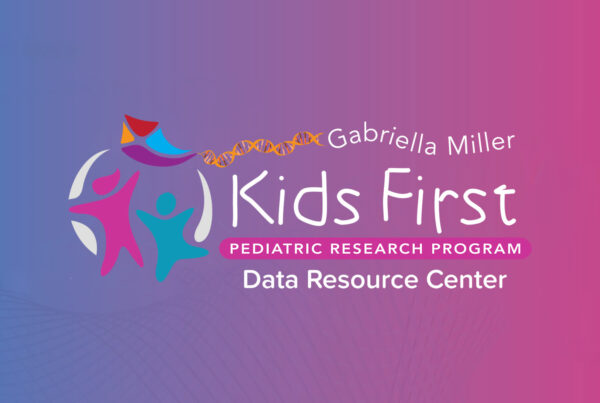Updates at the Kids First Data Resource Center – Spring 2022
The Gabriella Miller Kids First Data Resource Center (Kids First DRC) is proud of the growth we have seen so far this year and we are excited to work towards more breakthroughs across the pediatric research field. As always, we are committed to supporting and creating space for impactful collaborations, so do not hesitate to reach out to our team.
Now several months into the new year, the Kids First DRC is happy to share updates with our Kids First community, including the implementation of powerful data delivery enhancements and our involvement in impactful events such as The American Association of Cancer Research Annual Meeting.
Engaging with Patient Communities and Investigators
At the annual Rare Disease Day (RDD) conference, presented by the National Center for Advanced Translational Science (NCATS) on February 28, attendees had access to a live virtual booth presented by the Kids First DRC. Researchers looking to use Kids First DRC resources and tools for the first time, current users looking for updates, and rare disease patients looking to better understand current research practices were able to ask questions to our Scientific Community Program Manager Dr. David Higgins, who provided them with answers and resources to continue their relationship with Kids First.
Ahead of RDD, the Kids First DRC also held a virtual community open house on February 25th. The community of childhood cancer and structural birth defect families, foundations, and research advocates were invited to learn about everything the Kids First DRC has to offer. Attendees heard from experts on the creation of the program, how the model is pushing data sharing science forward, and how the powerful tools included in the portal can be used to support research across the pediatric cancer landscape.
As we welcome spring, we also welcome the season of exciting annual meetings, conferences, and community events for increased connection across the cancer research world.
The American Association of Cancer Research (AACR) 2022 Annual Meeting will be held in New Orleans, Louisiana from April 8-13. The AACR Annual Meeting is an incredible opportunity for scientists, health care professionals, survivors, patients, and advocates to come together to share and discuss the latest advances in cancer research and medicine. The Kids First DRC is excited to join this event on-site with an exhibitor booth, where our outreach team will share the latest information about the Kids First Data Resource, available tools and data, and opportunities to collaborate.
Kids First data experts and investigators will also join attendees at the Kids First DRC’s booth to take questions about their use of Kids First data in research and to provide user demos of the newest analysis tools to be released onto the Kids First portal.
And throughout the event, the Kids First DRC will work to highlight investigators and research partners who are scheduled to participate in speaking events and/or present poster abstracts across our social media channels. AACR attendees can visit the Kids First DRC booth #3435 throughout the Annual Meeting. And be sure to follow us on social media \@kidsfirstdrc for further updates and scheduled Kids First research presentations at AACR 2022.
On Wednesday May 11th, the NIH Common Fund’s Gabriella Miller Kids First Pediatric Research Program will host their Spring Update webinar. This event is open to the public and all are encouraged to attend to learn even more about the ever-expanding capabilities and reach of the Kids First program. Attendees will hear from representatives from NIH, X01 researchers such as Phil Lupo, and experts from the Kids First DRC, who will deliver updates on portal features and data inclusions.
Click here to learn more and to register for the event
Data Delivery
As of March 2022, researchers have access to 1.52PB of pediatric cancer data, consisting of genomic data from 12,000 families and 26,849 childhood cancer and structural birth defect patient study participants. New data are continually being added to the Kids First portal, but the processing of these data is not the only piece of the puzzle.
Anyone accessing data knows how impactful the data delivery process can be on overall project workflows. In collaboration with X01 researchers, members of the Kids First DRC Data Operations team have been working to deliver datasets related to areas such as laterality birth defects, CHARGE syndrome, orofacial clefts, and myeloid malignancies. While this work is underway, Portal users can expect to see exciting new data additions to come later this year.
In addition to strengthening data delivery methods through collaboration with X01 projects, the Kids First DRC is also working to develop new ways to process long read genetic data. A commitment to developing efficient ways to process long read data is bringing into focus areas of the genome that are under-examined using current standards. Until recently, long-read sequencing was still too expensive and difficult to use for regular sequencing of the human genome. But with efforts like those happening here at the Kids First DRC, investigators have more exciting tools at their disposal to advance research across rare pediatric conditions.
Inviting New Collaborations
The Kids First DRC works continuously to forge new collaborations and assist investigators around the world with the goal of maximizing the impact of pediatric cancer and structural birth defect research. Whether you are new to Kids First or a seasoned user, your input and user experience matters to us. Kids First DRC experts and administrators are committed to supporting efforts to develop better treatments and scientific insights for the benefit of children everywhere.
To get involved in these efforts, contact the Kids First DRC team at support@kidsfirstdrc.org.
You can also visit our Quick-Start guide to create your free Data Resource Portal account today!










